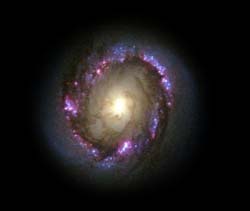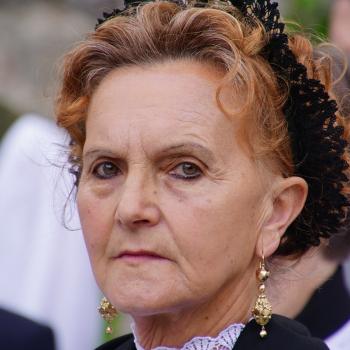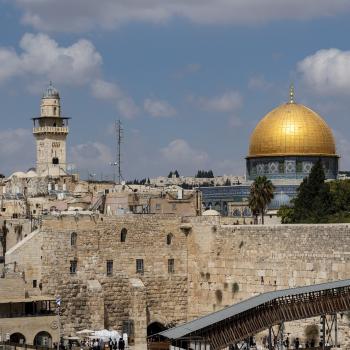 In Advent, I keep thinking about the Incarnation, and about all the Intention that resides in creation, the Intention that is, in fact, necessary to creation.
In Advent, I keep thinking about the Incarnation, and about all the Intention that resides in creation, the Intention that is, in fact, necessary to creation.
If one goes back to the first lines of Genesis and to the first lines of John's Gospel we see the same images -- emptiness, a Word, movement -- and it is natural to think that Christ's birth is a reflection of the whole "big bang" of Creation -- the first one made the world and everything in it, the second returned it to its origins, wedded in covenant. (I am one of those Christians completely comfortable with the idea that the Creation story in Genesis is simply another way of explaining our connections to stardust).
So, if we (or at least, I) am thinking along these lines -- of creation, intention, something from nothing, voids and space -- I'm describing Mary's virginal womb at the time of the Annunciation. But perhaps I am also describing the condition of Mary's own soul at the time of her own conception. The God of No Accidents, who Is, Was, Ever Shall Be, the God who breathed forth Creation with its Incarnational mirror already in place, knew his Vessel. He knew from where the Ark of his New Covenant would come, for he would provide it, and in the necessary -- pristine (not perfect, but pristine -- there is a difference) condition.
Gabriel called her "full of grace."
Mary had free will -- she could have said no to the angel's message -- but being "full of grace," why would she? She was born for her role in the pageant of salvation, that of assenting virgin, full of trust. If we think back to those lines from Genesis, and John, we can almost consider Mary-in-utero to be a sort of mirror of the quiescent "nothing" that existed before Creation. A created creature, loved into being and marked by grace, lies waiting to be born. She lives and grows obscurely, still this model of quiescence.
Then there is movement. God stirs, but this time, instead of saying, "Let there be . . . (light, etc.)," it is the created creature who says the Word as she utters her Fiat. "Yes," she says, "let it be . . ."
The words of Creation, of positive assent, affirmation, words that permit life rather than refuse. Thus creature co-operates with Creator and there comes a second, more muted, but not discreet "big bang" (what's discreet about angels, shepherds, and kings?) and the world is made anew. New Creation. New Creatures.
From the stillpoint "nothing" of Mary's physical and spiritual blank sheet, comes the rest of the story. Salvation. Return. The Way back to where we started.
Thomas Merton once wrote:
At the center of our being is a point of nothingness which is untouched by sin and by illusion, a point of pure truth, a point or spark which belongs entirely to God, which is never at our disposal, from which God disposes our lives, which is inaccessible to the fantasies of our own mind or the brutalities of our own will. This little point of nothingness and of absolute poverty is the pure glory of God in us. It is, so to speak, His name written in us . . . It is like a pure diamond, blazing with the invisible light of heaven. It is in everybody, and if we could see it we would see these billions of points of light coming together in the face and blaze of a sun that would make all the darkness and cruelty of life vanish completely.
I am a less elegant writer than Merton. When my kids were young, I described all of this to my children this way: "When we are created, the Creator puts a bit of himself in us -- the Divine Spark -- think of one of those cartoons where the sun spits a ray of light somewhere. Imagine God spitting his light into us, ptooooie! For our whole lives, we have that inside us, and since it is the part of us that belongs to God, is made from God, we long all our lives to find our way back to God, to be reunited -- to be whole. We are like plugs looking for the main outlet to which we can attach ourselves, forever."
A lot of people have issues with Mary, and with Mariology in general, and with the doctrines of her Immaculate Conception and her Perpetual Virginity. I'm not here to debate it; as Bernadette Soubirous -- the visionary of Lourdes who, in a small way, validated the dogma -- once said to her inquisitors, "my job is not to convince, only to inform."
I'm simply inviting you to hold on -- if only for Advent -- to this idea of "something from nothing," and consider that (as the angel said) "with God, nothing is impossible."
If the moving atoms of the world cease to move, we cease to be -- talk about "something" from "nothing" and the world of illusions!
When I think of all of this -- how the whole theme of "something from nothing" permeates the world and our lives -- then I wonder . . . how is it that people of faith can find so much about which to be contentious? For the God who created "something from nothing," immaculate conceptions and virgin births are cakewalks! So, for that matter, is the changing of humble bread and wine into the Body and Blood of the One who said, "my Flesh is real food, my Blood is real drink . . . "
"With God, nothing is impossible . . ." That's true. But also, perhaps, "With God . . . ‘nothing' is literally ‘not possible.'"
With God, there is no nothing, for even "nothing" is filled with Intention. And intention . . . assents. And assent . . . brings forth. It creates. And in every assent we utter, every stitch we knit, every empty bowl we fill, every lonely life we consent to touch, every hateful remark we respond to with love, we create something where there was nothing. With our every "yes," we assist in creation, with the continuation of the world. We work with the Creator, for whom no need is too small, for whom love knows no limits.
It is the great secret.
12/7/2010 5:00:00 AM





